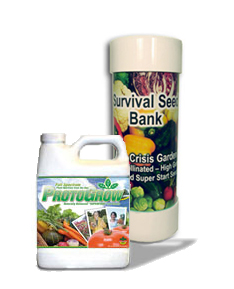Did you know that planting a vegetable garden makes you subversive?
It is according to Roger Doiron, the Director of Kitchen Gardens
International. A few months ago, Doiron gave a lecture at the famous TED
symposium and he pointed out the many ways that planting your own garden
is a subversive act.
First and foremost, as Doiron points out, growing your own food has the potential "to alter the balance of power, not only in our own country, but in the entire world."
And he's absolutely right.
|
Click here to order. |
You didn't know you had that much power, did you?
As Doiron points out, gardening is "a healthy gateway drug to other forms of food freedom." Soon you'll be cooking more of your meals from scratch, instead of buying chemical-laden prepared meals on your way home from work. You'll be canning and freezing and preserving your own garden-fresh produce instead of relying on industry to put it in cans lined with dangerous BPA for you.
Gardening, though, isn't just a way to reclaim some of the power that's been taken away from you over the past few decades. Soon, Doiron points out, home gardens will become an absolute necessity. By the end of the 21st century, the world's population will hit 10 billion. How will we feed them all, when already today 900 million people go hungry every year?
If you've assumed that "technology" will help us to feed the world in the years to come, you couldn't be more wrong. To keep up with population growth, according to a 2007 article published in the Guardian magazine, our world will have to produce more food in the next 50 years than it has in the past 10,000 years put together.
Why The Industrialized Food System Is Doomed To Failure
An unflinching look at the facts makes it clear that industrialized agriculture simply isn't sustainable. For starters, it takes too much fuel. In the industrial farming system, it takes 10 calories of fossil fuel energy to yield just 1 calorie of food energy. That's a net loss in every bite. And as fuel prices go up, and up, and up, it will only become more apparent what a bad bargain that is. To make matters even worse, farmland is vanishing at an alarming rate, as acre after acre falls to development or even drought.
Along with the disappearing farmland, by the way, genetic diversity is vanishing even more quickly. Experts believe that 90% of all vegetable varieties went extinct in the 20th century. Such genetic diversity is the best food insurance policy we could have - and we blew it.
And then there are genetically modified foods. They were supposed to increase yields ... but instead, crop failures are actually increasing with GM seed. GM pollen drifts to neighboring farms and contaminates other crops. And then there are the very real, very frightening health dangers from consuming GM foods - allergies, autoimmune disorders, infertility, and more.
It's hard to believe we don't have enough food when you visit a grocery store.
But that's the thing. Most of what you see in a grocery store isn't even real food.
In the average grocery store, there are over 30,000 different products on the shelf. But what you see in those bright boxes and bags isn't real food. And there's no real genetic diversity. The vast majority of packaged foods contain at least one of three ingredients: wheat, corn, or soy (most of it genetically modified). Food manufacturers just rearrange the same few ingredients and combine them with artificial chemicals to give the illusion of variety and the appearance of real food. Ironic, isn't it:
Over 30,000 items on the grocery store shelves ... and as a nation, we're fatter and sicker than ever before.
(Gee, it couldn't have anything to do with the way we produce food, could it?)
Fuel-hogging industrial agriculture ... vanishing farmland ... billions more mouths to feed in the coming decades ... frankenfoods that are making us sicker and sicker, and spiking medical costs ... when will we come to our senses?
The Solution Is As Close As Your Own Backyard
Now do you see how growing your own food is an elegant, simple solution to all these problems? When you plant a garden, you grow real food, nutrient-dense food, that's not been poisoned by pesticides or contaminated by GMOs.
Roger Doiron makes no bones about it: he believes that the day is rapidly approaching when family vegetable gardens will be an absolute necessity to provide enough food. We agree with him.
When that day comes, will you be prepared? You will be, if you have the Survival Seed Bank.
Solutions From Science
815 W. Main St.
P.O. Box 518
Thomson, IL 61285
Email us at
info@solutionsfromscience.com
